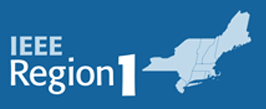
- This event has passed.
Technical Briefs on Modal Array Signal Processing and Undersea Tracking
January 13, 2022 @ 5:30 pm - 9:00 pm
Modal Array Signal Processing: A Brief Introduction
The scalar acoustic pressure sound field obeys the Helmholtz equation. It can be shown that under certain restrictions, pressure or particle velocity measurements on a closed surface can be used to uniquely infer the entire acoustic field. This observation leads to a different beamforming methodology for volumetric arrays where instead of combining filtered outputs of individual sensors, the measurements can be used to spatially decompose the array response in terms of an orthonormal basis defined by the array surface resulting in “eigenbeams.” Modal beamforming is then performed by linearly processing over the eigenbeams to realize desired beampatterns. Since the number of modes can be significantly less than the number of sensors there is a computational advantage over classical methods. Additionally, modal processing offers a layer of abstraction (the “eigenbeams space”) to accommodate a wide variety of array geometries which simplifies downstream processing tasks. However, sensitivities to shape deformation, such as an array in typical oceanic currents may undergo, are not amenable to classical error tolerance analysis and novel approaches to “array-healing” must be explored. To clarify these concepts an example of a moored cylindrical array of sensors in a typical ocean environment is shown.
Undersea Tracking: From Kalman Filters to Particle Flow Filters
As foreign navies become increasingly more prolific and more capable and foreign submarines become quieter, the US Navy is working to enhance their undersea situational awareness capability. The goal is to create a Single Integrated Undersea Picture (SIUP) to monitor large volumes of the ocean. Undersea tracking has always been challenging due to high densities of dynamically moving contacts, environmental conditions causing shadow zones resulting in intermittent tracks, low SNR conditions, non-Gaussian noise, and non-linearities in the system and measurement models. Over the years, a myriad of different contact tracking solutions have been proposed with varying degrees of success, starting with simple Kalman filters and most recently particle flow filters. This brief will walk us through the history of sonar tracking algorithms focusing mainly on submarine sonar tracking systems. Variants of the Kalman filter will be discussed along with Multiple Hypothesis Tests, Interacting Multiple Models, Maximum Likelihood Estimators, Particle Filters, and Particle Flow filters. Recent developments in deterministic and stochastic flow models will also be discussed. In numerical experiments, particle flow filters have been shown to reduce computational complexity by many orders of magnitude relative to standard particle filters or other state-of-the-art algorithms for the same filter accuracy. Moreover, particle flow filters can reduce the filter errors by many orders of magnitude relative to the extended Kalman filter or other state-of-the-art algorithms for difficult nonlinear non-Gaussian problems.
Speaker(s): Dr. Kevin Bongiovanni, Dr. Ken McPhillips
Agenda:
5:30 PM – Cocktails (cash bar)
6:00 PM – Modal Array Signal Processing
6:30 PM – Particle Flow Filters for Tracking
7:00 PM – Dinner*
*Please register in advance; Dinner menu preview is available at www.galleygrille.com
The Galley Grille at White’s of Westport, 66 State Road, Westport, Massachusetts, United States, 02790, Virtual: https://events.vtools.ieee.org/m/293930


